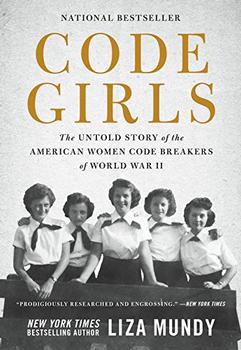Reading Guide Questions

Please be aware that this discussion guide will contain spoilers!
- What particular skills and characteristics did the Army and Navy look for in the women recruited to their code-breaking programs? How do you believe stereotypes about women were employed or challenged in the recruitment effort?
- How do you imagine World War Two affected personal and romantic relationships? What do you think were Americans' attitudes toward marriage then—and did those attitudes change at all for the "code girls" generation?
- Why do you think Dot Braden and Ruth "Crow" Weston became such great friends? If they had met in other circumstances or in peacetime, do you think they would have gotten along just as well?
- Consider the various motivations Mundy cites for the women who signed up as code breakers. Do you feel they differed from those of the men serving in America's military then?
- Some of the code girls were affected by the extended secrecy of their work. How do you imagine that keeping secrets, however necessary, might affect a person's relationships or her identity in the world?
- What in your opinion were the particular successes and struggles of Agnes Driscoll? Why might she have eventually resorted "to extreme measures to retain her authority"?
- What does it mean that the organizational hierarchy of Arlington Hall was relatively "flat"? How do you think this was beneficial to the code girls?
- Frank Raven, while acknowledging the skills of the "damn good gals," also concluded that many of the code girls were "damn pretty gals." What effect might this statement and the perspective of people like Raven have had on the women and their work?
- Barnard's Virginia Gildersleeve noticed in the marching WAVES "a remarkable cross section of the women of the United States of America, from all our economic and social classes ... and from all our multitude of racial origins and religions." What might have caused such diversity and co-operation, and how do you think this changed after the war, if at all?
- What do you believe were the challenges for many of the women after the war?
- Why do you think these women's contributions to cryptanalysis remained a secret for so long?
- Mundy suggests that "many of the code-breaking women ... advance[d] the feminist movement." Do you agree?
- In January 2016, the American armed services lifted the ban on women serving in positions of direct combat. What challenges do you think women still face in the military today? What is your view of women serving in combat positions?
- Why do you think the services considered women more suitable for code-breaking work than men? There are still many professions today where one sex is favored over the other. Which ones come to your mind and do you think this will ever change?
- Most of the women were children of the Depression. How do you feel this impacted their decision to enlist, if at all?
- The Army and Navy went about recruiting women differently. Do you think one of the branches had better results? Why or why not?
- Did any of the women stand out for you? Whose story most moved you?
- Do you think the women employed as civilian code-breakers faced challenges that their enlisted male counterparts did not?
- Do you believe the women had an impact beyond the end of the war, and if so, what?
- In what ways do you find that America at war today is different than it was during past wars? Why do you feel this has changed over the decades?
Discussion guide provided by the publisher supplemented with additional questions from BookBrowse.
Unless otherwise stated, this discussion guide is reprinted with the permission of Hachette Books.
Any page references refer to a USA edition of the book, usually the trade paperback version, and may vary in other editions.

 Book Reviewed by:
Book Reviewed by:





